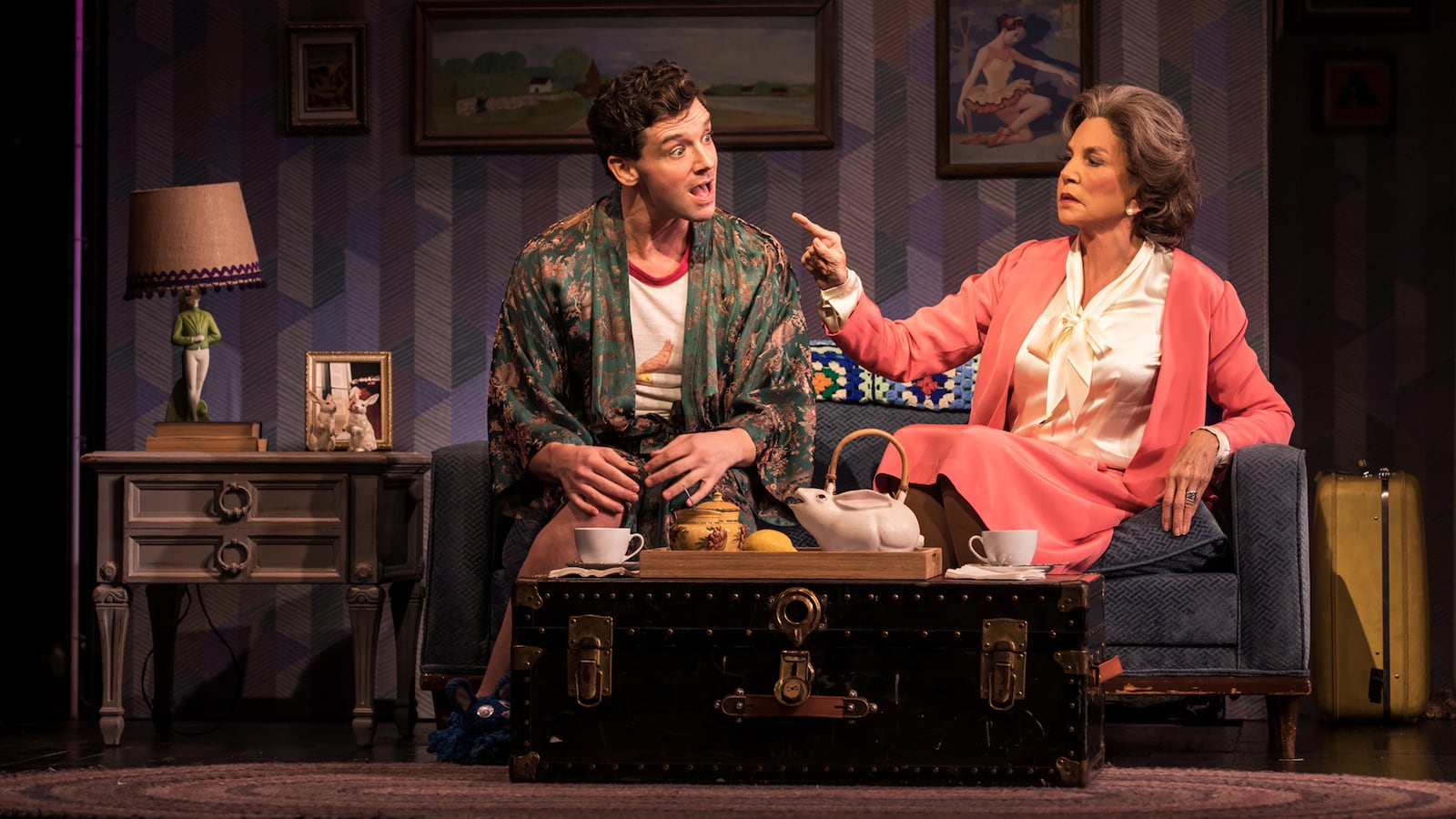Watching this wonderful production of Harvey Fierstein’s Torch Song, my laughter and leaking eyes close cousins for its 2 hours and 35 minutes, this critic felt an approximation of what he has felt watching plays like The Boys In The Band, Angels in America, The Normal Heart, and Beautiful Thing.
These gay-themed plays’ success has led them to migrate from small stages to Broadway and the West End: big time Straightsville. One feels proud and also watchful as these plays unfold in bigger, mainstream spaces. You look around and you listen. What will straight people laugh at, what will they laugh with, and how will they laugh? What will they understand and what won’t they understand?
A good play should transcend boundaries, and yet you feel a strange mix of proud, proprietorial, and nervous watching LGBT plays set sail on the theatrical high seas. And it’s a familiar gay nervousness: it boils down to, “This is ours. How will I, how will we, be seen? Will we be heard?”
At the beginning of this 2nd Stage production, newly transferred to Broadway, to the melody of Helen Morgan’s ‘I See Two Lovers,’ Arnold (Michael Urie) faces the audience in his dressing room at the International Stud bar in 1974 as he gets ready for a drag show. His character name is Virginia Ham (he's already been Kitty Litter, Bertha Venation, and Bang Bang LaDesh).
Throughout the play, Arnold—mostly in civvies, rather than drag—addresses us in his throaty, galloping burr. We are a real audience and also an unseen one. But Arnold doesn’t seek understanding, he expects to be understood. We’re his intimate companions, but he isn’t holding us gently by the hand. We are required to enter his world and mind, and get acquainted pretty quickly. Arnold is a camp gay man, and one who we are invited to laugh with, laugh at, and also take deadly seriously.
The play’s most emphatically asked question is “what is enough,” but Torch Song is an even more emphatic assertion of gay selfhood and pride.
Like The Boys In The Band, it requires a modern audience to think about the past, not just as a setting on the stage in front of them, but as the vital context from which this slice of life was born. Don’t judge Torch Song by today’s anything; journey back with it and learn something.
Before marriage equality was even a dream, it maps the trajectory of one gay man’s life, from working the bars and haunting the bars and getting fucked in a backroom, to a halting journey towards love and commitment, and then configuring a then-radically new definition of family via three separate acts.
The play is split up into three distinct acts: “The International Stud” set in 1974; “Fugue In a Nursery” in 1975; and “Widows & Children First” in June 1980. Think legally and culturally where LGBT life was back then, and it makes Torch Song's tonal relevance today that much more impressive. Fierstein's play isn't a prophecy, but it is a totem of gay strength and persistence.
Torch Song, directed with supple command by Moisés Kaufman, is a compression of Fierstein’s Torch Song Trilogy, first performed in totality in 1981 (after its first two sections were performed in 1978 and 1979 respectively). The play later was made into a 1988 movie in which he played Arnold (as he had done on stage), co-starring Matthew Broderick and Anne Bancroft.
Torch Song’s action exists pre-AIDS: homophobia, parental tensions, self-acceptance, and the search for love and family are its themes.
Urie does not ape Fierstein’s rough-then-silken Jewish brogue, but he is just as magnetic and embracing a performer, switching adeptly between Arnold’s many moods, and making sure the best-known one-liners hit perfectly: “I’ve been beautiful. And Lawd knows I’ve been young. But never the twain have met”; “It’s the daylight you gotta watch out for. A thing of beauty is a joy ‘til sunrise!”; “The person who think they’s mature enough to handle an affair that’s hopeless from the beginning is the same person who keeps the publishers of Gothic Romances up to their tragic endings in mink”; “There are easier things in this life than being a drag queen, but I ain’t got no choice. Try as I may, I just can’t walk in flats.”
There is something so much more fluid, coherent, and winning about this production compared to its first iteration at 2nd Stage’s off-Broadway Tony Kiser Theater, which felt off-kilter to me in pacing and production.
Maybe it’s the effect of looking up to the performers rather than looking down. Scenic designer David Zinn and lighting designer David Lander capture (sparingly) the backroom of International Stud, the massive bed to illustrate the various sexual and romantic tangles of the play’s second movement, and then eventually Arnold’s inviting home.
Urie’s physical comedy is never better than when, just solo on stage, he conveys getting fucked in the backroom of the bar by an unseen man, and trying to carry on a conversation or even have a cigarette, as his body judders this way and that.
The will-they-won’t-they factor is supplied by bisexual Ed (Ward Horton). Really, any actor like Horton playing the callow Ed has the most uninviting and thankless role to play, being the guy who can’t make up his mind who he wants, and what he wants—instead bringing all-round chaos.
Is the play anti-Ed, anti-bisexual? No, but he hurts Arnold, in the random wrecking-ball way that some people like Ed do things. Horton plays his blankness, his emotional detachedness, with a grimly cheery sincerity.
“What’s the matter? Catch your tongue in the closet door?” Arnold says to Ed, to audience cheers, after Ed has gone on once too often about his “straight” other life. By being Ed’s victim, Arnold wonders, “What if it’s me using him to give me that tragic torch singer status I admire so in others?”
But he loves him, he shrugs, what can he do?
Three years later, “Fugue in a Nursery” sees Ed invite Arnold and his new, much younger partner Alan (Michael Hsu Rosen) to visit him and his female partner Lauren (Roxanna Hope Radja) in Ed’s countryside place.
Kaufman configures this visit and its consequences using a massive bed as its own mini-stage and arena of combat. With its flapping duvet and switching combinations, it feels like a seventies sex comedy, with queerer sharper wit. “Platter, platter on the stack. Does she think I want him back?” Arnold says to Lauren, when they are left alone, immediately addressing the Ed-sized elephant in the room.
The years have transformed Arnold: he seems more in control, and settled with his younger boyfriend. He is both in thrall to his beauty, and also not standing for any silliness. (“God you’re beautiful. Now go away,” he says, wanting to sleep.)
Torch Song’s third act is when the fireworks and tears really start, with the arrival of Arnold’s mother (Mercedes Ruehl), a heat-seeking missile of maternal love, guilt, judgment, and gaslighting.
The set is now a home, a cozy one at that, with stenciled bunnies on the walls to match Arnold’s slippers. He has a foster son, David (Jack DiFalco), a troubled gay kid thriving under his care, and Ed is still there “not-sureing” about what he wants and making inedible breakfast dishes. David is a ball of camp energy, though looks too adult on stage to be a teenager.
“The Sylvia Sidney of Brighton Beach,” Arnold calls his mother, and the excellent Ruehl comes not in peace, but to fiercely contest her son’s right to be himself and to victimize him for.
The comedy of Torch Song is so fast that the raw switches between zingers and raw cruelty this third act are particularly winding; Urie spends much of it speaking gutturally through tears as Ma’s onslaught continues. We have the quickfire genius of Ma learning David is gay, and remarking: “But he’s only been here six months” to scarring confrontation, with Urie and Ruehl circling each other like prizefighters—and Arnold wrily notes it is like a boxing match.
Ma clammed up when Arnold’s father died, he says, and then expected Arnold to clam up when Alan died. It is the manner of his death, and Arnold’s combined grief, fury and upset around it is a conflagration of the personal (losing the man he loved so violently) and political (the homophobia underpinning that violence is more softly echoed by his own mother).
The question of what is “enough,” the preoccupying question of the play, is most pronounced here; what Arnold demands is respect, and if his own mother cannot accord him that she is not welcome in his home.
He tries to make her understand what it is like to be gay in a world that renounces your presence. But her viciousness careers out of control, until she says some truly despicable things, producing a gale of shocked sighs in the audience. That signals how good and powerful Urie and Ruehl are in these scenes, and the play’s final scene is the most moving distillation of what is “enough” for Arnold.
That final moment, the play’s final image, shows us a story of a gay man’s life and struggle and what he has fought and learned to cherish and hold close.
Like The Boys In The Band, Torch Song interrogates some questions of gay identity and living that may seem antic. In both plays, they are not. Their characters and questions, their truths, are timeless and universal—but you need to meet them in their own past to best understand them. In the story of Arnold, Torch Song supplies one of theatre’s truest, most holistic and funny distillations of what gay pride really means: its cost, its benefits, and its necessity.
Torch Song is at the Hayes Theater, 240 West 44th Street, NYC, booking to February 7, 2019.







